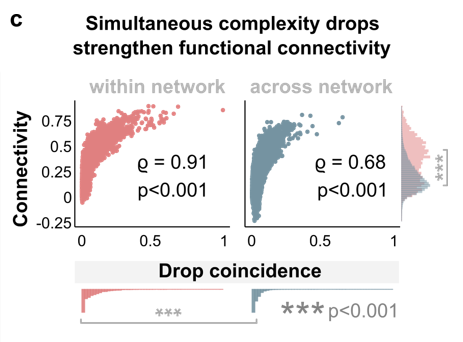
Delighted to share our latest preprint in which we describe a ubiquitous complexity architecture of large-scale brain activity - a "human complexome" that unifies important organizational principles of functional brain networks. biorxiv.org/content/10.110…
With @Schwaenina @LeoWaschke @AmyRomanello @martin_gell @Garrett_Neuro and @carstenfinke, we looked at the #variability of resting-state BOLD signals and found that the #brain shows spontaneous episodes of neural regularity that become apparent as transient "complexity drops". 

The tendency of brain regions to engage in these complexity drops together strongly explained functional connectivity strength between them - convergent with the co-fluctuations described by @FarnazZEs @richardfbetzel - and reflected canonical resting-state networks. @bttyeo 

Intriguingly, these drops are propagated across the brain in a highly structured manner, similar to @dillannewbold @ndosenbach's recent findings on spontaneous activity pulses. It seems that these may represent moments of regularity that spread across the brain. 

Additionally, this propagation intrisically followed the unimodal to transmodal hierarchy (panels f+g) recently reported by @DanielMargulies and colleagues. This raises the exciting possibility that the brain might spontaneously reiterate its own functional architecture.
Next we turned to the temporal states of functional networks and asked if such states might be rooted in underlying neural states of complexity. @vdcalhoun @DaniSBassett @AndrewZalesky @foxmdphd @DrBreaky
Supporting this idea, we found a default neural state of high complexity with gradually more infrequent low-complexity states (driven by complexity drops). The default complexity state entailed low coupling, high modularity, and low efficiency within the connectome. 

In contrast, the infrequent low-complexity states resulted in momentary increases in coupling and efficiency and decreases in modularity.
These dynamics suggest that such neural states may implement a moment-to-moment tradeoff between default segregation (maintaining low cost?) and occasional integration (enhancing communication?), in line with the seminal work by @spornslab @edbullmore and others.
The spatial embedding of these complexity states again strongly converged with the uni-to-transmodal functional gradient and furthermore with myelination as a proxy of anatomical hierarchy. @juhuntenburg @reindervosdwael (thanks again for the toolbox info!) @BorisBernhardt 

While we were able to replicate the gradient-myelin association, accounting for complexity states completely resolved this effect (panel g), but not vice versa, suggesting that these neural states may link microstructure and functional hierarchy. @misicbata @DanielMargulies
Finally, lower signal complexity was linked to lower age and better cognitive and motor performance, suggesting that an increased capacity for complexity drops might be beneficial for brain function. 

Thank you so much if you made it all the way here. These ideas of course rest on much more previous work not all mentioned here and started during the 2019 @OHBM meeting in Rome. We're more than happy to discuss, hopefully soon in person again!
• • •
Missing some Tweet in this thread? You can try to
force a refresh



